At the Aspen Institute Economic Opportunities Program, and for our many colleagues and partners, the ongoing and intertwined health, economic, and racial justice crises bring new urgency to our work to improve access to quality jobs, options to participate in business ownership, and the freedom to pursue economic opportunity. Below we share our monthly newsletter with highlights of recent work. As always, we welcome your feedback, thoughts, and partnership in advancing inclusive opportunity and an economy in which we all can thrive. Click here to subscribe.
Click here to view past editions of our newsletter.
Upcoming Events
EOP will continue to host virtual events and webinars this season. Join our mailing list and follow us on social media to learn when new opportunities are available.
April 21: Mark Your Calendars for a Special Event on Caregiving
The pandemic has underscored the value of caregiving work and the need for equitable and affordable access to care. Yet care work remains underpaid and often invisible, deepening challenges for caregivers and families. As we move from crisis to recovery, how can we build a care economy that dignifies the work of caregivers and expands access to quality care? Join us on Wednesday, April 21, from 2:00 to 4:00 p.m. ET for a special event on the role of caregiving in our society and ideas for building an equitable care economy. Our speakers include Abby McCloskey (Founder, McCloskey Policy LLC; Fellow, Bipartisan Policy Center), Ai-jen Poo (Executive Director, National Domestic Workers Alliance; Director, Caring Across Generations), Adria Powell (President and CEO, Cooperative Home Care Associates), Tina Tchen (President and CEO, TIME’S UP Now), moderators Erika Beras (Reporter, Marketplace) and Dorian Warren (President, Community Change), and more to be announced. Click here to register.
News and Updates
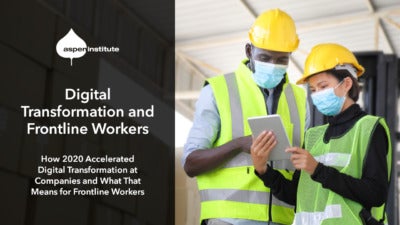
How 2020 Accelerated Digital Transformation at Companies and What That Means for Frontline Workers
2020 was an unprecedented year of change, especially for how businesses operate and the way people live and work. Upskill America spent the last six months interviewing and surveying employers about how events in 2020 — the pandemic and heightened attention on systemic racism — are influencing the types of new skills needed by frontline workers; employer-funded education and training programs and other workplace supports for frontline and entry-level workers; and strategies to enhance racial equity and inclusion in the workplace. Read the report.
We shared highlights of the survey findings during our event, “Transformation in 2020: How 2020 Accelerated Digital Transformation at Companies and What That Means for Frontline Workers.” In this conversation, our panelists shared how they are adapting to the accelerating need for digital skills. Panelists also discuss how empathy and communication from managers and leadership, in addition to enacting benefits that are responsive to worker needs, have been critical to supporting frontline workers during this time. Watch, listen, and learn more.

Video: How Can the Financial System Convert the Value and Promise of Entrepreneurship into an Asset?
Business Ownership Initiative Director Joyce Klein and Revolve Principal Jonathan Brereton joined FINTECH+ Host John Hucker to talk about the recently announced Entrepreneur Backed Assets (EBA) Fund. As they describe, EBA Fund aims to strengthen the capacity of community-based financial institutions to lend to small businesses in low-income communities and those owned by people of color. The conversation delves into the background of the Fund, its key objectives, the ongoing challenges of financing bottom-up entrepreneurship, and the role of sustainable, inclusive fintech. “In many ways, EBA Fund has been my inspiration over this past year,” says Klein. “It feels like we’re building something that’s a solution to what we’re seeing happenings.” Watch now.
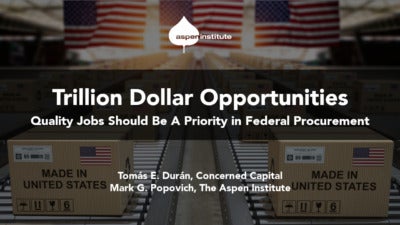
Trillion Dollar Opportunities: Quality Jobs Should Be A Priority in Federal Procurement
Through legislation, proposals, and executive actions, the Biden-Harris administration has signaled its interest in keeping and creating jobs. But if the past year has taught us anything, it’s that not every job is a good one. In a new blog post, Good Companies/Good Jobs Initiative Director Mark Popovich and Job Quality Fellow Tomás Durán, president of Concerned Capital, argue that public procurement should include job quality and equity as factors in awarding government contracts. “With an additional trillion dollars or more soon to be flowing through federal procurement, we have a unique opportunity,” they write, “to align public spending with what the economy needs and the public supports – higher job quality and accessible and inclusive opportunities for all.” Read more.
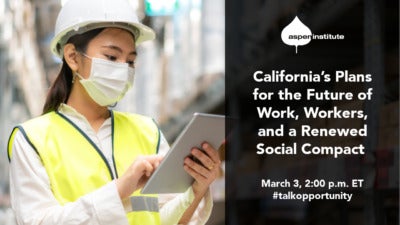
Video: California’s Plans for the Future of Work, Workers, and a Renewed Social Compact
As the nation grapples with economic inequities that have been growing for decades and exacerbated by the pandemic, how can we ensure that workers of every race, ethnicity, geography, and gender can support themselves and their families? California’s Future of Work Commission, established before the pandemic, has been tasked with confronting this question. On March 3, we hosted a discussion on “California’s Plans for the Future of Work, Workers, and a Renewed Social Compact,” featuring the state’s labor secretary and commission chairs. Speakers include Mary Kay Henry (International President, Service Employees International Union), James Manyika (Senior Partner, McKinsey & Company; Chairman and Director, McKinsey Global Institute), Julie Su (Secretary, California Labor and Workforce Development Agency), and moderator Eduardo Porter (Economics Reporter, The New York Times). Watch, listen, and learn more.
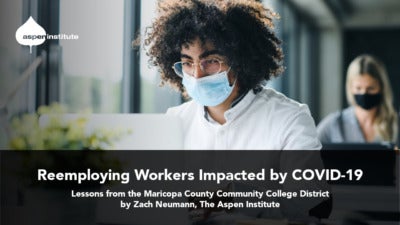
Reemploying Workers Impacted by COVID-19: Lessons from the Maricopa County Community College District
How can local systems help reemploy hospitality workers displaced during COVID-19? In a new blog post, Future of Work Initiative Senior Project Manager Zach Neumann highlights efforts in Phoenix to use existing data to connect workers with real, local jobs, and training to help them succeed. Drawing on the experience of leaders from the Maricopa County Community College District supporting displaced and underemployed workers during the COVID-19 health and economic crisis, the blog points to a model where public, post-secondary educational institutions can offer short, customized courses that help workers quickly transition into new careers. Read more.
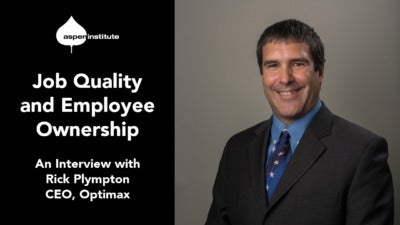
Job Quality and Employee Ownership: An Interview with Job Quality Fellow Rick Plympton (CEO, Optimax)
In a new interview with EOP Executive Director Maureen Conway, Job Quality Fellow Rick Plympton describes why his company, Optimax, created a nonprofit employee ownership trust with a perpetual purpose statement. The trust’s purposes include ensuring the business will not be sold to another entity, will continue monthly profit sharing with employees, and will position the company for ongoing growth. This approach will provide for the eventual retirement of the owners while also buttressing the resiliency of the company and ensuring it continues to contribute to the region’s economic and social needs. “[It’s] a structure that we believe could be successful for 100 years.” Read more.
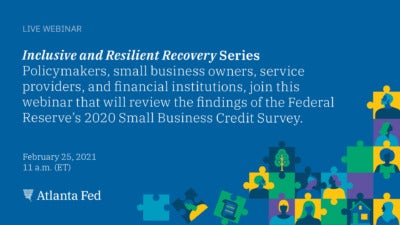
Video: Supporting Small Businesses in the Pandemic and Beyond
Business Ownership Initiative Director Joyce Klein participated in a webinar hosted by the Federal Reserve Bank of Atlanta, “Small Business Credit Survey: Findings, Implications, and Opportunities for an Inclusive and Resilient Recovery.” The discussion offered an overview of findings from the 2020 Small Business Credit Survey and a discussion of approaches for an inclusive recovery. Klein spoke alongside Brian Bond (Experian), Ines Hernandez (Citigroup Inc.), Latresa McLawhorn Ryan (Atlanta Wealth Building Initiative), and the Atlanta Fed’s Mels de Zeeuw and Mary Hirt. The video for this event, part of the Atlanta Fed’s Inclusive & Resilient Recovery event series, is now available. Watch now.

UpSkill America Leads Creation of Employer Network Advancing Digital Skills and Equity
More than a dozen leading employers are joining forces to form the Employer Network Advancing Digital Skills and Equity, a peer network of employers from across industry sectors who are working to ensure the country’s workers, learners, and communities have the digital access and digital skills essential for thriving in a post-COVID digital economy. Led by UpSkill America in partnership with Digital US, this network leverages their collective reach and deep understanding of employer and community needs to share information and accelerate widespread scaling of high quality, employer recognized resources, training, and effective practices to build digital resilience. Learn more.
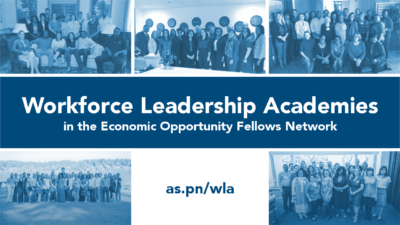
Updates from the Workforce Leadership Academies
Fellows of the Greater Phoenix Workforce Leadership Academy are being chosen this month. The Academy, held in partnership with the Center for the Future of Arizona, kicks off in April! Stay tuned for more information about the Academy and the Fellows who’ve been selected to join the Economic Opportunity Fellows Network and a growing network of WLA alumni.
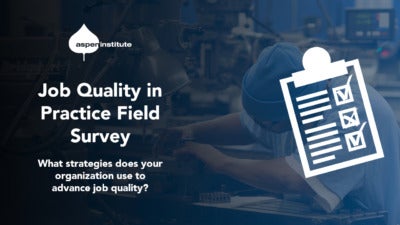
Job Quality in Practice Survey
What strategies does your organization use to advance job quality? What resources are useful in your work? How has the past year influenced your approach? Across the country, a wide variety of organizations and businesses are innovating to improve job quality—and the experiences of the past year have underscored the importance of this work. Our Job Quality in Practice Field Survey, which closed last week, will help us build an understanding of the supports organizations need to move a job quality agenda forward. Thanks to all who participated! We will share survey findings in future events and publications. Stay tuned.
Join the conversation
Follow EOP on social media to join the conversation!
-Workforce Strategies Initiative @AspenWorkforce
-Business Ownership Initiative @Aspen_BOI
-UpSkill America @upskillamerica
-Future of Work Initiative @AspenFutureWork
About EOP
The Aspen Institute Economic Opportunities Program (EOP) advances strategies, policies, and ideas to help low- and moderate-income people thrive in a changing economy. We recognize that race, gender, and place intersect with and intensify the challenge of economic inequality and we address these dynamics by advancing an inclusive vision of economic justice. For over 25 years, EOP has focused on expanding individuals’ opportunities to connect to quality work, start businesses, and build economic stability that provides the freedom to pursue opportunity. For more information, visit as.pn/eop.
EOP has several initiatives, including the Business Ownership Initiative, Workforce Strategies Initiative, UpSkill America, Good Companies/Good Jobs, and the Future of Work Initiative. In addition, across these approaches EOP hosts the Economic Opportunity Fellows Network and the Opportunity in America event series.
Thank you to our many partners and funders for supporting our efforts.
Support Our Work
We are committed to making our events and publications freely available to everyone who finds them useful. But if you find value in our work and are able to support it, please consider making a tax-deductible donation. Click here to learn more.
Keep in Touch
Click here to join our mailing list. For updates every day, follow us on social media.

